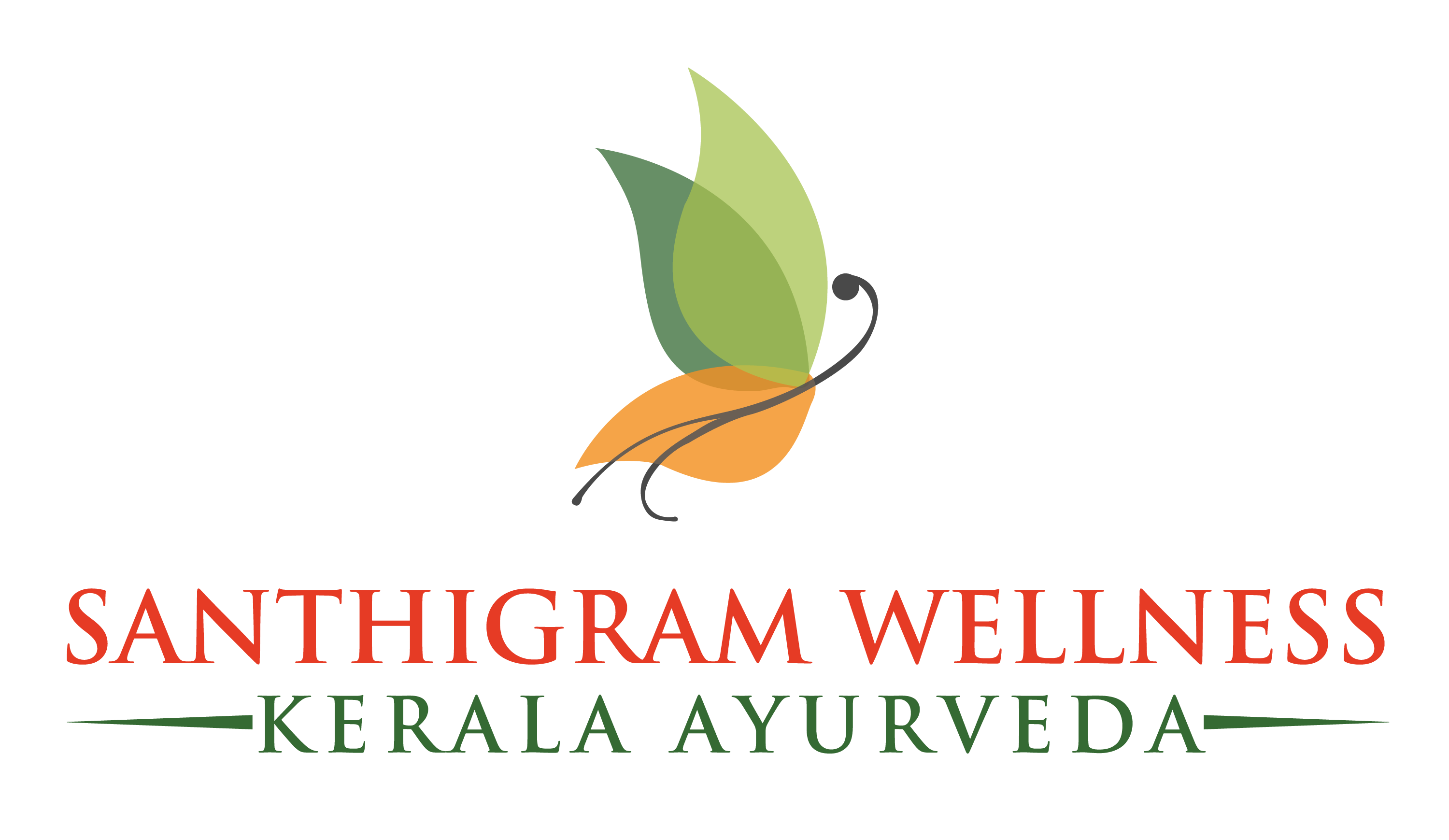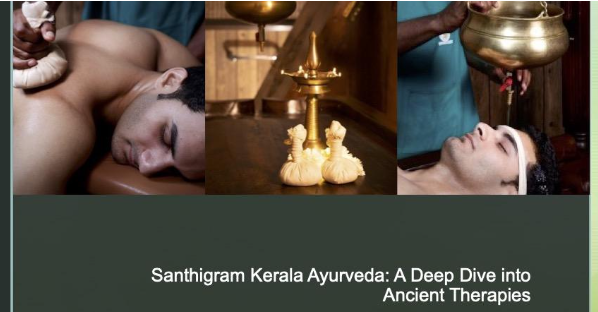Introduction to Panchakarma
Panchakarma1 is an ancient system of detoxification and rejuvenation that originates from the rich Ayurvedic tradition of Kerala. The term “Panchakarma” translates to “five actions” or “five treatments,” reflecting the comprehensive nature of this holistic approach. It is designed to cleanse the body, mind, and spirit, promoting overall well-being and balance.
Kerala, often referred to as the cradle of Ayurveda, has preserved and perpetuated this profound healing tradition for centuries. Panchakarma is highly revered in this region, where it is practiced with meticulous adherence to classical Ayurvedic texts. The primary objective of Panchakarma is to eliminate toxins (ama) from the body, thereby restoring the natural balance of the doshas (biological energies) – Vata, Pitta, and Kapha.
The holistic approach of Panchakarma encompasses five distinct detoxification treatments:
Vamana (emesis): This treatment involves induced vomiting to cleanse the stomach and eliminate toxins from the upper gastrointestinal tract. It is particularly beneficial for individuals with Kapha imbalances.
Virechana (purgation): Virechana aims to cleanse the intestines by inducing purgation. This treatment is effective in removing Pitta-related toxins and is employed to address various digestive and metabolic disorders.
Basti (enema): Basti is considered one of the most important treatments in Panchakarma. It involves the administration of medicated oils or decoctions through the rectum to cleanse the colon and balance Vata dosha. Basti therapy is renowned for its rejuvenating and nourishing effects.
Nasya (nasal administration): Nasya involves the administration of medicated oils or powders through the nasal passages. This treatment is used to cleanse the head and neck region, alleviate sinus congestion, and enhance mental clarity.
Raktamokshana (bloodletting): Raktamokshana is a therapeutic procedure to remove impure blood from the body. This treatment is employed to address conditions related to blood impurities and to balance Pitta dosha.
Through these meticulously designed treatments, Panchakarma not only detoxifies the body but also rejuvenates the entire system, offering a profound sense of rejuvenation and well-being.
The Five Detoxification Treatments
Panchakarma, a cornerstone of Ayurveda, comprises five primary detoxification treatments designed to cleanse and rejuvenate the body. These treatments—Vamana, Virechana, Basti, Nasya, and Raktamokshana—are tailored to expel toxins and restore balance within the body’s systems, offering profound therapeutic benefits.
Vamana (Emesis)
Vamana, or therapeutic vomiting, is primarily recommended for Kapha-dominant individuals. This treatment aims to expel toxins accumulated in the upper gastrointestinal tract. During Vamana, a patient ingests specific herbal decoctions and medications that induce controlled vomiting. The process helps in clearing the respiratory tract and stomach, thereby reducing conditions such as asthma, bronchitis, and chronic sinusitis. Vamana not only purges the body of excess mucus but also enhances digestive fire (Agni), leading to better metabolism and overall vitality.
Virechana (Purgation)
Virechana is a purgative therapy that targets the expulsion of toxins from the intestines. It is particularly beneficial for individuals with Pitta imbalances. In this procedure, patients are administered herbal laxatives that facilitate the elimination of toxic waste through bowel movements. By cleansing the liver and intestines, Virechana helps in treating conditions such as jaundice, skin disorders, and chronic fevers. The therapy also improves digestion and absorption, promoting a balanced and healthy metabolism.
Basti (Enema)
Basti is considered one of the most effective treatments in Panchakarma, aimed at cleansing the colon and balancing Vata dosha. This procedure involves the administration of medicated oils or herbal decoctions through the rectum. Basti not only detoxifies the colon but also nourishes the tissues, alleviating conditions like constipation, arthritis, and neurological disorders. By restoring the colon’s health, Basti helps in the overall rejuvenation of the body and supports the proper functioning of the digestive system.
Nasya (Nasal Administration)
Nasya involves the administration of medicated oils or powders through the nasal passages, targeting the purification of the head region. This treatment is particularly effective for Kapha-related disorders and aims to clear the sinuses, improve respiratory functions, and enhance mental clarity. Nasya is beneficial in treating conditions such as migraines, chronic sinusitis, and allergies. By facilitating the expulsion of toxins from the head and neck, this therapy promotes better sensory and cognitive functions.
Raktamokshana (Bloodletting)
Raktamokshana is a therapeutic bloodletting procedure aimed at detoxifying the blood. This treatment is especially useful for conditions arising from blood impurities, such as skin disorders, hypertension, and certain types of arthritis. Raktamokshana can be performed using various methods, including leech therapy and venipuncture. By removing contaminated blood, this procedure helps in reducing inflammation and promoting the regeneration of healthy blood cells, thus enhancing overall health and well-being.
Each of these Panchakarma treatments plays a crucial role in detoxifying the body, balancing the doshas, and rejuvenating the system. By undergoing these therapies under the guidance of skilled practitioners at Santhigram Kerala Ayurveda, individuals can experience profound health benefits and a renewed sense of vitality.
Tailoring Panchakarma to Individual Needs
Santhigram Kerala Ayurveda offers a unique approach to Panchakarma, recognizing the diverse needs and health conditions of each individual. The cornerstone of this approach is the personalized nature of the treatments, which are meticulously tailored to address the specific requirements of each person. Central to this customization is the initial assessment process, where experienced Ayurvedic practitioners conduct a comprehensive evaluation of an individual’s doshas (body energies) and health history.
During the initial assessment, practitioners at Santhigram Kerala Ayurveda carefully examine the balance of the three doshas—Vata, Pitta, and Kapha—within the body. This evaluation is crucial in understanding the unique constitution of each individual. By delving into health history, lifestyle, diet, and emotional well-being, practitioners gain a holistic view of the individual’s health status. This thorough assessment enables the design of a customized Panchakarma treatment plan that targets specific imbalances and health issues.
The personalized treatment plans at Santhigram Kerala Ayurveda are pivotal in achieving profound detoxification, stress relief, and overall well-being. Each Panchakarma therapy is selected and adjusted to align with the individual’s dosha constitution and health needs, ensuring maximum efficacy. By addressing the root causes of health issues rather than just the symptoms, these tailored treatments facilitate a deeper level of healing and rejuvenation.
Moreover, the customization of Panchakarma therapies contributes significantly to stress relief. Personalized treatments that consider an individual’s unique stressors and lifestyle factors can more effectively alleviate mental and physical tension. This holistic approach not only detoxifies the body but also harmonizes the mind and spirit, promoting a balanced and healthier life.
In conclusion, the bespoke Panchakarma treatments at Santhigram Kerala Ayurveda underscore the importance of personalized care in Ayurvedic medicine. By focusing on individual needs and constitutions, these therapies offer a path to deep detoxification, stress relief, and enhanced overall well-being, embodying the true essence of Ayurveda.
Holistic Benefits of Panchakarma
Panchakarma, an essential component of Ayurvedic therapy, offers a multitude of holistic benefits2 that extend beyond mere physical well-being. At Santhigram Kerala Ayurveda, this ancient detoxification and rejuvenation process is designed to restore balance within the body, eliminate accumulated toxins, and rejuvenate the entire system. This profound system of healing addresses the physical, mental, and spiritual dimensions of health, enhancing overall quality of life.
One of the most significant physical benefits of Panchakarma is its impact on digestion. By purging the body of toxic build-up, Panchakarma treatments can significantly enhance digestive function, leading to better nutrient absorption and a more efficient metabolism. This cleansing process also contributes to enhanced immunity, making the body more resilient against common illnesses and chronic conditions.
Mental health and clarity are equally emphasized in the Panchakarma regimen. The therapies involved are known to reduce stress levels, which is increasingly vital in today’s fast-paced world. As stress diminishes, mental clarity and focus improve, enabling individuals to navigate their daily lives with a calmer, more centered mindset. This mental rejuvenation often leads to heightened productivity and better emotional regulation.
On a spiritual level, Panchakarma fosters a deeper connection with one’s inner self. The treatments encourage a state of meditative relaxation, facilitating a sense of peace and spiritual awakening. This holistic approach ensures that the benefits of Panchakarma extend beyond the immediate physical realm, promoting long-term well-being and harmony.
Real-life testimonials and case studies from Santhigram Kerala Ayurveda further attest to the efficacy of Panchakarma. Individuals have reported significant transformations, from alleviation of chronic ailments to a newfound sense of vitality and mental clarity. These personal success stories underscore the comprehensive benefits of Panchakarma, making it a compelling option for those seeking profound and sustainable health improvements.
References
1. Ojha DV, Shrivastava DV, Acharya DP, Shukla DOP. Role of Panchakarma in Ayurveda. World Journal of Pharmaceutical Research. 2023;12(15):12.
2. Gore VS, Bhatkar AU. Critical Appraisal of the Role of Panchakarma in Global Health Care. YMT International Journal of Ayurvedic system of medicine. 2022;(2):6.

